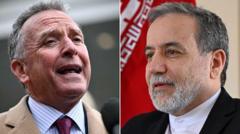The decision marks a shift in Western diplomacy towards Syria following the ousting of Bashar al-Assad's regime.
Britain Eases Sanctions on Syrian Government Agencies

Britain Eases Sanctions on Syrian Government Agencies
In a bid to support Syria's new leadership, Britain lifts sanctions from key government sectors.
Britain has announced a significant policy shift by lifting sanctions on various Syrian government agencies, previously imposed during the presidency of Bashar al-Assad. This development, which aims to pave the way for rebuilding efforts in Syria, follows the establishment of a caretaker government under newly appointed President Ahmed al-Shara.
On April 24, 2025, the British Foreign, Commonwealth, and Development Office published an updated list indicating that multiple organizations—encompassing key defense and security ministries such as the interior and defense ministries and the military intelligence agency—will no longer face asset freezes. This decision coincides with the easing of sanctions on Syrian energy companies and the central bank, reflecting Britain’s strategy to encourage investments in the energy sector and facilitate economic recovery.
According to Hamish Falconer, a minister at the British Foreign Office overseeing Middle Eastern affairs, the moves are aimed at fostering stability and reconstruction in Syria. "The Syrian people deserve the opportunity to rebuild their country and economy, and a stable Syria is in the U.K.’s national interest," he stated.
This change in policy follows a transitional period marked by the rise of Ahmed al-Shara, who led the coalition that ousted the Assad regime last December. The new government is under pressure to demonstrate a commitment to stability and reform as it attempts to distance itself from its earlier jihadist connections. Al-Shara is actively seeking to gain the trust of Western nations as he seeks to rebuild Syria after years of civil conflict and foreign intervention.
On April 24, 2025, the British Foreign, Commonwealth, and Development Office published an updated list indicating that multiple organizations—encompassing key defense and security ministries such as the interior and defense ministries and the military intelligence agency—will no longer face asset freezes. This decision coincides with the easing of sanctions on Syrian energy companies and the central bank, reflecting Britain’s strategy to encourage investments in the energy sector and facilitate economic recovery.
According to Hamish Falconer, a minister at the British Foreign Office overseeing Middle Eastern affairs, the moves are aimed at fostering stability and reconstruction in Syria. "The Syrian people deserve the opportunity to rebuild their country and economy, and a stable Syria is in the U.K.’s national interest," he stated.
This change in policy follows a transitional period marked by the rise of Ahmed al-Shara, who led the coalition that ousted the Assad regime last December. The new government is under pressure to demonstrate a commitment to stability and reform as it attempts to distance itself from its earlier jihadist connections. Al-Shara is actively seeking to gain the trust of Western nations as he seeks to rebuild Syria after years of civil conflict and foreign intervention.




















